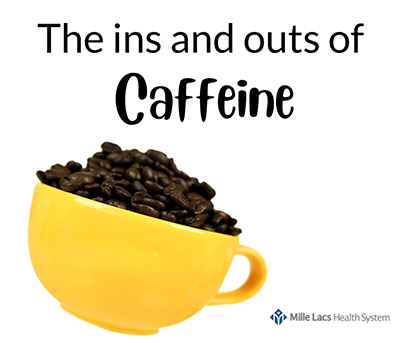The ins and outs of caffeine
August 25, 2023
Caffeine is a complicated compound. It is most commonly found in tea, coffee, chocolate, sodas, and energy drinks. Caffeine acts as a stimulant to the central nervous system. Depending on the individual, and also depending on certain factors at the time, caffeine can be either helpful or harmful.
The U.S. Food and Drug Administration (FDA), says about 80 percent of U.S. adults take some form of caffeine every day. The FDA recommends that healthy adults should limit their caffeine intake to 400 milligrams — the equivalent of about four (8 oz) cups of coffee or two energy drinks — per day. Pregnant women, children, and those with certain medical conditions should limit their caffeine intake.
Daily caffeine consumption can cause an individual to develop a caffeine tolerance over time. This means the body does not feel the desired effects of caffeine as it used to such as the energy boost and alertness that caffeine can offer. A caffeine tolerance means your body is addicted to the caffeine and will experience withdrawal symptoms if it doesn’t get its regular quantity, but it can also mean the same amount of caffeine will not offer the same desired effects which can lead to an increase in caffeine intake.
Interestingly, a lack of typical caffeine consumption can cause a headache, but on the flip side (particularly for not heavy caffeine consumers) consuming caffeine can also help relieve headache pains. Consuming too much caffeine in a short period of time can also cause a headache. It’s important to know your body and not make extreme changes in your caffeine consumption too quickly.
Caffeine is a common ingredient in many over-the-counter and prescription medicines. This is important to consider when taking certain medications as additional caffeine consumption may have negative effects. Caffeine is not a pain reliever on its own, but when combined with certain medications it can help relieve discomfort as it has been found to help speed up the absorption and effectiveness of the drug. Additional health benefits that studies have found moderate caffeine consumption to offer include reducing the risk of Parkinson’s disease, Alzheimer’s disease, and liver cancer.
Some medications and herbal supplements can interact negatively with caffeine. Ephedrine is a medication used commonly in decongestants. Mixing caffeine with it may increase the risk of high blood pressure, heart attack, stroke, or seizure. The herbal supplement Echinacea which is sometimes used to prevent colds or infections can increase the concentration of caffeine in your blood when mixed with caffeine. This can cause symptoms of caffeine overload such as headache, insomnia, nervousness, and irritability.
Ultimately, the health effects of caffeine depend on many factors, including the amount consumed, the individual’s sensitivity to caffeine, and their overall health. For most people, moderate caffeine consumption is safe and may even have some health benefits. However, excessive caffeine consumption can lead to negative side effects and should be avoided.
